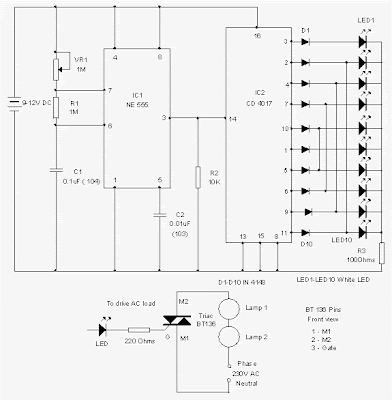Here may be a easy LED chaser simulating a scanner through the rear and forth light-weight result. It used high bright White LEDs to grant the chaser result. The circuit uses an oscillator to provide quick pulses and a decade counter to drive the LEDs.
IC1 is intended as an astable multivibrator to grant continuous positive pulses to the last decade counter. Variable resistor VR1, R1 and C1 kind the timing elements. By adjusting VR1, it's attainable to alter the speed of the scanning LEDs.
Output pulses from IC1 are fed to the clock input of the last decade counter IC2. Resistor R2 keeps the clock input of IC2 low once every positive to negative transitions of input pulses. this can be necessary as a result of generally the clock input of the last decade counter stays positive and doesn't settle for input pulses.
IC1 is intended as an astable multivibrator to grant continuous positive pulses to the last decade counter. Variable resistor VR1, R1 and C1 kind the timing elements. By adjusting VR1, it's attainable to alter the speed of the scanning LEDs.
Output pulses from IC1 are fed to the clock input of the last decade counter IC2. Resistor R2 keeps the clock input of IC2 low once every positive to negative transitions of input pulses. this can be necessary as a result of generally the clock input of the last decade counter stays positive and doesn't settle for input pulses.
LED Scanner Circuit
All the 10 outputs are utilized in the circuit to drive the LEDs. Diodes D1 through D10 (IN 4148) do the trick of forward and backward chasing result. Out of the 10 diodes, eight diodes kind OR gates to direct the outputs of IC2 to LEDs. The remaining 2 diodes maintain the brightness of the 2 ungated LEDs. 1st six outputs of IC2 works within the straight thanks to provide the running result.
The diode connected to the pin five of IC2 is connected to the cathode of the diode from pin ten (5th LED). This reverses the running sequence within the backward direction. Output half-dozen drives the fourth LED and also the method repeats up to the 2nd LED connected to output pin2.The reset pin fifteen and also the Clock inhibit pin thirteen of IC2 are connected to ground so IC2 will run freely.
The diode connected to the pin five of IC2 is connected to the cathode of the diode from pin ten (5th LED). This reverses the running sequence within the backward direction. Output half-dozen drives the fourth LED and also the method repeats up to the 2nd LED connected to output pin2.The reset pin fifteen and also the Clock inhibit pin thirteen of IC2 are connected to ground so IC2 will run freely.








0 comments:
Post a Comment